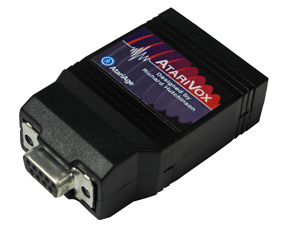Roll over! Sit! Speak!
So here's the dillyo (word up)...
Since several of you regular readers (yes, you) just so happen to be 2600 programmers (who, I might add, are some of the most talented, creative, and staggeringly intelligent people on the face of the planet), I thought I'd ask for some programming help. And I figured it would be more appropriate to do it here, than clutter up the homebrew forums.
Now, by "help" I actually mean "do (most of) the programming for me". But I figured you already saw that coming - what with the staggering intelligence and all. I'm not operating under any delusions here of programming something entirely by myself. But, the goal of this little endeavor is to actually try and help programmers, by doing some drudge work for them (you).
Specifically, for the AtariVox.

My understanding of this little box is, that it takes quite a bit of trial-and-error to come up with decent sounding voices for it. And I'd like to see more homebrew games use it. It's a cool piece of gear. So I'd like to take a shot at doing some of that trial and error.
I've downloaded the AtariVox Programming Guide, the SpeakJet User Manual, and the PhraseALator Dictionary, and have a reasonable understanding of what you need to enter in as far as the voice data goes.
What I need, is a template.
Basically, a simple chunk of code (if there is such a thing) where I can just drop in the appropriate lines of code to create voices (and other AtariVox sounds), so I can then build a working binary, and load it into my Krokodile Cart, and test them. Then go back, modify and refine them, and eventually pass the results on to homebrew authors to use in their games.
Think of it as audible sprite drawing. ![]()
If anyone's interested (or even thinks this is a workable idea) let me know. For that matter, if it's not a workable idea, you should let me know that, too. ![]()


33 Comments
Recommended Comments